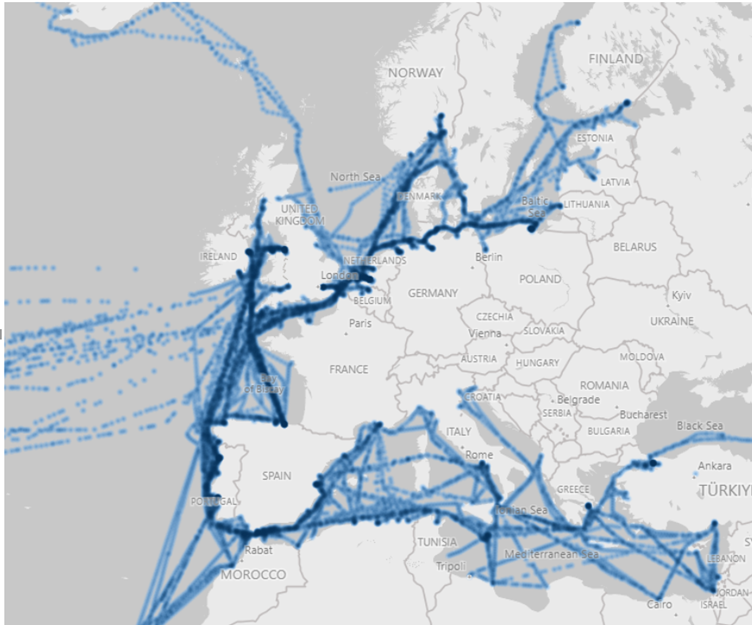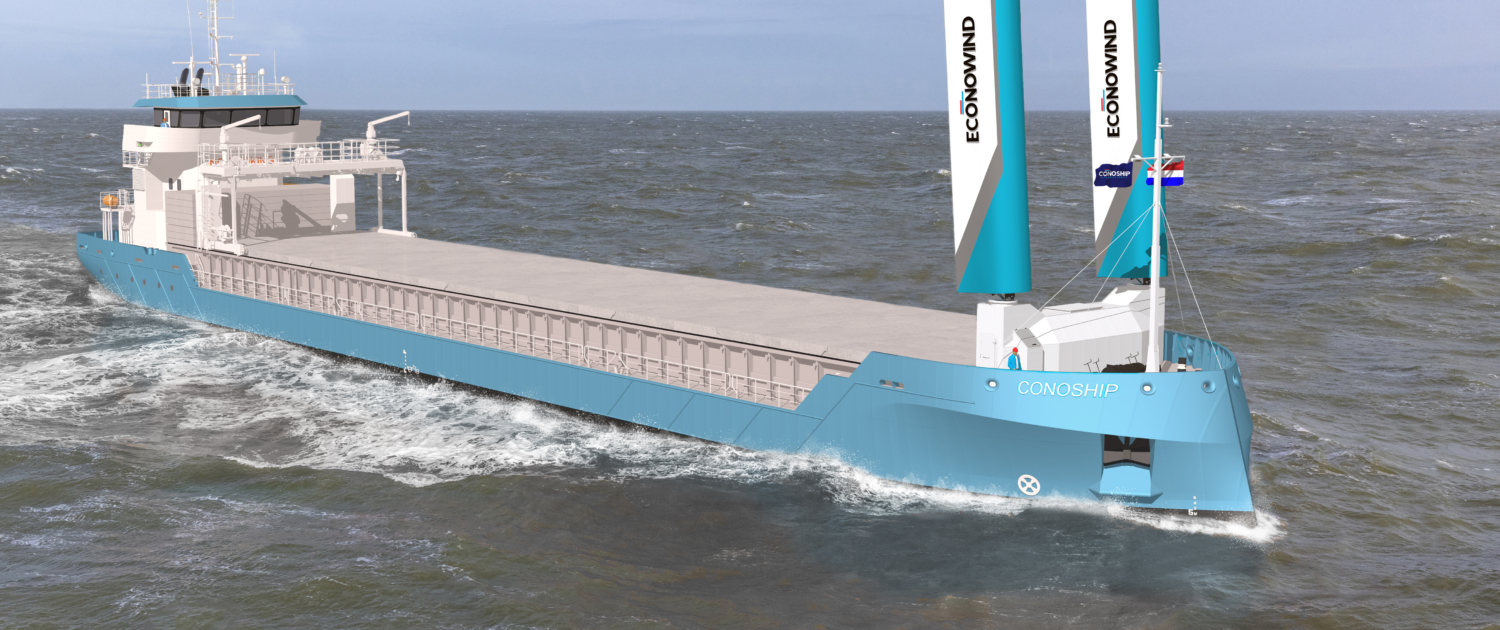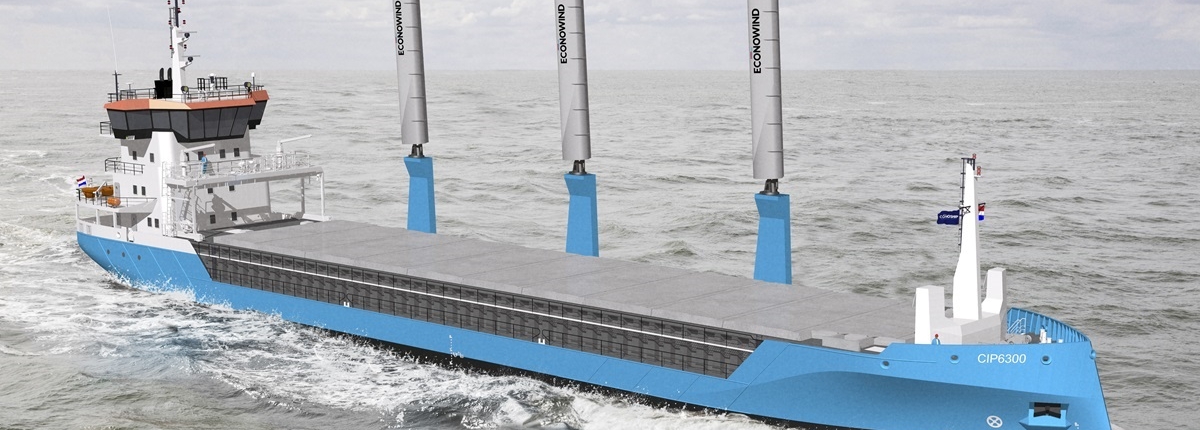CIP-series: The advantages of Conoship’s new standard designs
The CIP3600 is the first design Conoship developed of the CIP-series of standard vessels we introduced to the world last year. Unlike the automotive- and aviation industry, standard designs are rarely used in shipbuilding. Most designs are tailor-made because you need a large market for a standard design. Our new design concept, the CIP-series, looks set to boost the industry while reducing CO₂ emissions from shipping. What are the advantages of this standard design series for shipowners and investors? In this article, you can read all the advantages, and we share in-depth information about our vision for the new standard for general cargo vessels.
CIP-series: The most future proof and fuel-efficient coaster in the market
The vessels in the CIP-series developed by Conoship International Projects (CIP) are innovative, future-proof, and environmentally friendly general cargo vessels. The vessels can be considered in the market as the new standard for general cargo vessels.
Following the success of the CIP3600, Conoship International also designed a 3800 tdw and 6300 tdw for the transport of general cargo inland as well as coastal waters.
The vessels in the CIP-series are equipped with a diesel-electric propulsion system, a large propeller diameter, and optimized hull lines which lead to the lowest possible fuel consumption and come with the option to install VentoFoil units for further fuel reduction. It features a single cargo hold with high cubic capacity making it ideal for carrying a variety of heavy and light cargo. The well-thought-out design allows for the possibility of changing the fuel type in the future.
Main particulars of the CIP3800 and CIP6300
| Length overall | 89.43 | m |
|---|---|---|
| Breadth moulded | 13.20 | m |
| Draught design | 4.30 | m |
| Draught maximum | 5.25 | m |
| Deadweight @ T = 5.25 m | 3,640 | t |
| Hold volume | 195,290 | cu.ft |
| Service Speed | 10.30 | kn |
“With these new vessels Hartel Shipping will position its fleet on the forefront of sustainability in the short-sea market. We can meet any logistical challenge with these three vessels, we are ready to embark the future”.
John Brobbel – CEO of Hartel Shipping & Chartering
| Length overall | 99.99 | m |
|---|---|---|
| Breadth moulded | 15.85 | m |
| Draught design | 6.50 | m |
| Draught maximum | 6.75 | m |
| Deadweight @ T = 5.25 m | 6,375 | t |
| Hold volume | 316,278 | cu.ft |
| Service Speed | 10.00 | kn |
We were pleased with the performance of the vessels, particularly their fuel efficiency. When we started looking at the future of general cargo vessels, the CIP3600 was a strong proposal. We were impressed with the research that had gone into the design, from modern building techniques to features regarding the vessel’s operation. It was also important to us that the design balanced practicality with the long-view over the vessel’s lifetime, allowing for flexibility regarding future fuel innovations and changes in emissions legislation.”
Oya Aksoy – board member of Gelibolu Shipyards, building the first CIP3600
Based on the same concept of this series, new designs for a 5000 tdw and 7000 tdw are in development and will be brought to market soon.
Why should you invest in a standard vessel design?
There are several advantages to invest in our standard design of the CIP-series. The emphasis of the CIP-series is on providing value for money to the customer with optimum time and cost without compromising quality, and specifications. However, the beauty of Conoship’s approach lies in its flexibility, as it offers customers the opportunity to build their vessels in a shipyard of their choice. On the other hand, the design is highly future-proof. A switch of fuel type to future fuels such as liquid hydrogen or ammonia is facilitated by smart arrangement design, where the requirements of the future fuels have been taken into account from the beginning of the conceptual design process.
The advantage include:
- Value for money
By designing and building for a specific market and standardising certain ship types, product innovations can be introduced more easily and with less risk. So, investing in a standard design has financial consequences as the design package is more affordable.
- Reduced delivery time
Standardisation of the design speeds up the delivery time. Opting for a standard design of the CIP-series reduces the delivery time for you, the customer because the design and processes have already been prepared.
- Future-proof design
The design of the CIP-series is highly future-proof. The EEDI of the vessel as calculated as a diesel-driven vessel is already 30% below the phase 3 requirements without additional measures compliant beyond 2040. Additional elements of the design arrangement facilitate a switch to future fuels. “For example take off the generators and replace them with a methanol power generator set and then put in methanol tanks as well, or take them off completely and put on liquid hydrogen tanks and fuel cells,” explains Jan Jaap Nieuwenhuis, Managing Director at Conoship International. “All these redesign possibilities were taken into account from the beginning of the conceptual design process.”
![]()
- Flexible supply chain
As a customer, you always have the option of having Conoships’ standard design ship built at a shipyard of your choice. This level of customisation allows our customers to realise their maritime visions while tailoring every aspect of the shipbuilding process to their specific requirements. Conoship facilitates seamless collaboration between the customer and the chosen shipyard, resulting in the construction of vessels that optimise excellence.
- Reduce CO₂
The fuel consumption of the vessels in the CIP-series will be best in class, with its well thought out diesel-electric propulsion system, enlarged propeller in combination with a ConoDuctTail®, and optimised hull lines. To further improve its performance, the design is ready for wind-assisted propulsion, as it is prepared for the placement of Econowind VentoFoils®, which would reduce the fuel consumption and CO2emissions by abt. 10%, depending on the sailing route.
After reading all these advantages not sure which type of the CIP-series fits best for you? Feel free to contact us for more information.
| Need some advice? Contact us to discuss what fits best for you.
Curious how we can make the CIP standard vessels methanol ready? In the next article, we will tell you all about it! In the meantime make sure to follow us on LinkedIn to read our latest news.





 Conoship International
Conoship International
